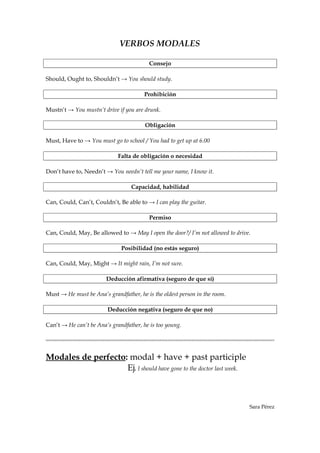
Modales
- 1. VERBOS MODALES Consejo Should, Ought to, Shouldn’t → You should study. Prohibición Mustn’t → You mustn’t drive if you are drunk. Obligación Must, Have to → You must go to school / You had to get up at 6.00 Falta de obligación o necesidad Don’t have to, Needn’t → You needn’t tell me your name, I know it. Capacidad, habilidad Can, Could, Can’t, Couldn’t, Be able to → I can play the guitar. Permiso Can, Could, May, Be allowed to → May I open the door?/ I’m not allowed to drive. Posibilidad (no estás seguro) Can, Could, May, Might → It might rain, I’m not sure. Deducción afirmativa (seguro de que sí) Must → He must be Ana’s grandfather, he is the oldest person in the room. Deducción negativa (seguro de que no) Can’t → He can’t be Ana’s grandfather, he is too young. Modales de perfecto: modal + have + past participle Ej. I should have gone to the doctor last week. Sara Pérez